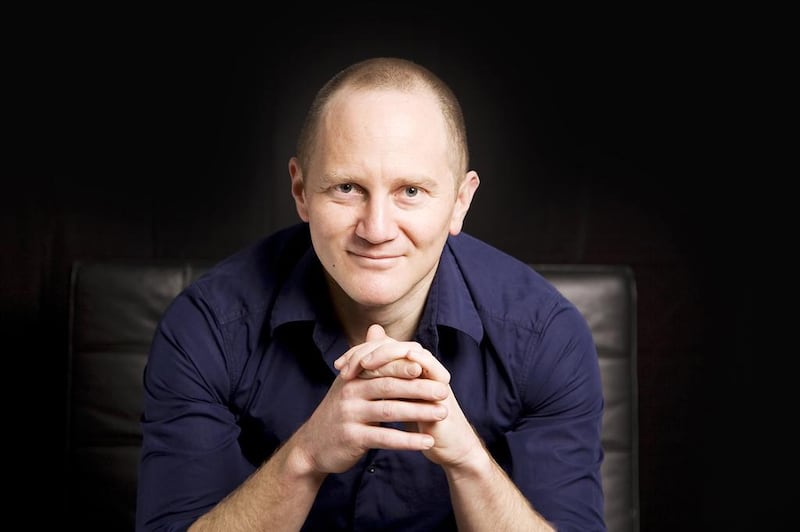Chris Cleave’s novels can be best described as timely.
Best-selling debut Incendiary – a bereaved mother's letter to Osama bin Laden following an imagined terror attack – stoked controversy after coincidently being published on the same day as the 2005 London bombings.
Follow-up The Other Hand (2008) addressed the world of asylum seekers.
Sports drama Gold, about the rivalry of two friends and professional cyclists dropped on the eve of the 2012 London Olympics.
But for his fourth and most intimate novel, the 42-year-old writer looks back to the most-defining global event of the past century, the Second World War.
Everyone Brave is Forgiven details a handful of lives, through the turbulent years of 1939 to 1942, at the novel's heart is an unsentimental love story inspired by Cleave's own grandparents.
“I reached 40 and said ‘look, I’m just going to act as if every novel is my last, and I might not get another chance’,” says Cleave.
“I turned myself inside out for this one – it’s the story of my roots, where I came from – because I really wanted to know.”
The idea was sparked a decade ago, when Cleave’s grandfather, an antiques restorer and part-time newspaper columnist, asked him to type up his war memoirs. These 200 “terribly handwritten” sheets documented his time in the British Army’s Royal Artillery, surviving the harrowing two-year Siege of Malta, which echoes experiences of the book’s hero, Alistair.
“I idolised my grandfather, really,” says Cleave. “He was 84 or 85, he was closing in and he decided he wanted to write about the war for the first time.
“And what’s striking is he didn’t write about any of the hardship – he wrote about what made him laugh.”
Cleave’s greatest regret is that his grandfather passed away, aged 94, before the book was complete.
Cleave then followed in his footsteps.
He toured Malta, sleeping in the same spots as his grandfather, conducting interviews with surviving islanders.
He read only pre-1942 novels and listened to wartime music. He even lived on the British wartime rations, a “horrible – really horrible” experience. “Feeling yourself disintegrating was really demoralising,” says Cleave of his immersive research approach. “I think that generation’s teeth basically fell out.”
Cleave’s greatest resource, however, were his grandparents letters.
Like her fictional counterpart – also called Mary – Cleave’s grandmother stayed in London throughout the war, running a school for “children who didn’t fitin”.
When his grandfather departed for Malta, he gave his wife-to-be an engagement ring of nine diamonds – one for each time they had met. The young lovers would not lock eyes again for more than three years, but communicated fervently through patchy military mail.
More than 1,000 of the grandfather’s letterssurvived – the complete stash of his grandmother’s replies were sunk by a German submarine.
In the novel, Alistair and Mary share less than 24 hours together, but fall in love through pithy written exchanges.
Yet this novel is no holiday romance. War, and its consequences, are the book’s true subject. In Cleave’s words, “everyone is damaged” by war.
But something fresh is brought to the overflowing table of wartime fiction. The book’s third key character is Zachary, the 11-year-old son of a black entertainer who suffers violent prejudice in the countryside following evacuation. Winding up back in the capital, and in Mary’s class, Zachary offers Cleave an anchor to profile London’s substantial black community which he claims have been “written out of history”.
“Having an original angle gave me a really good reason to go in,” adds Cleave. “This is a whole part of our history we’ve dismissed; Why is that? And if that’s been written out, what else has?”
Without offering any spoilers, it is fair to say this story doesn’t wrap with the fireworks of a Hollywood ending. Instead Cleave offers a “very realistic” resolution, holding the door open for a forthcoming sequel. The follow-up will trace the changing fortune’s of Cleave’s country in the period 1945-1948, using existing characters to explore the social and political upheaval of the post-war period which laid the foundations of “Modern Britain”; Labour’s landmark socialist government and creation of a National Health Service, the mass immigration of the “Windrush generation” following the British Nationality Act 1948, which granted citizenship to all across the Commonwealth.
“For me, what’s even more remarkable than that generation winning the war, is deciding how they are going to shape the peace,” adds Cleave. “In wartime, bravery is the fashion, but what is bravery in peacetime?
“The process of taking a world that’s in ashes, and choosing a future – that generation came back from fighting, and instantly created the prototypical western democracy. Take the whole world down – and build it up again.”
• Everyone Brave is Forgiven is out now
rgarratt@thenational.ae





